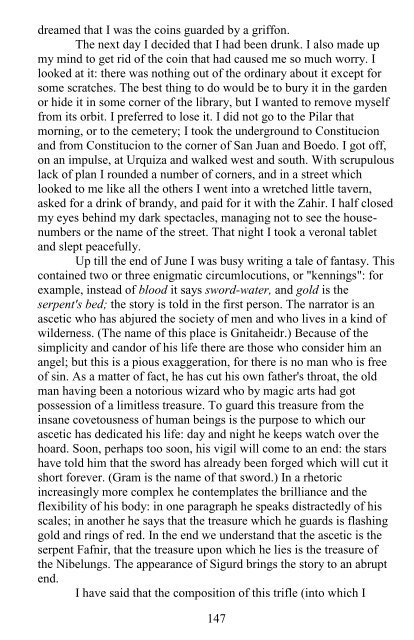Jorge Luis Borges - Labyrinths
Jorge Luis Borges - Labyrinths
Jorge Luis Borges - Labyrinths
You also want an ePaper? Increase the reach of your titles
YUMPU automatically turns print PDFs into web optimized ePapers that Google loves.
dreamed that I was the coins guarded by a griffon.<br />
The next day I decided that I had been drunk. I also made up<br />
my mind to get rid of the coin that had caused me so much worry. I<br />
looked at it: there was nothing out of the ordinary about it except for<br />
some scratches. The best thing to do would be to bury it in the garden<br />
or hide it in some corner of the library, but I wanted to remove myself<br />
from its orbit. I preferred to lose it. I did not go to the Pilar that<br />
morning, or to the cemetery; I took the underground to Constitucion<br />
and from Constitucion to the corner of San Juan and Boedo. I got off,<br />
on an impulse, at Urquiza and walked west and south. With scrupulous<br />
lack of plan I rounded a number of corners, and in a street which<br />
looked to me like all the others I went into a wretched little tavern,<br />
asked for a drink of brandy, and paid for it with the Zahir. I half closed<br />
my eyes behind my dark spectacles, managing not to see the housenumbers<br />
or the name of the street. That night I took a veronal tablet<br />
and slept peacefully.<br />
Up till the end of June I was busy writing a tale of fantasy. This<br />
contained two or three enigmatic circumlocutions, or "kennings": for<br />
example, instead of blood it says sword-water, and gold is the<br />
serpent's bed; the story is told in the first person. The narrator is an<br />
ascetic who has abjured the society of men and who lives in a kind of<br />
wilderness. (The name of this place is Gnitaheidr.) Because of the<br />
simplicity and candor of his life there are those who consider him an<br />
angel; but this is a pious exaggeration, for there is no man who is free<br />
of sin. As a matter of fact, he has cut his own father's throat, the old<br />
man having been a notorious wizard who by magic arts had got<br />
possession of a limitless treasure. To guard this treasure from the<br />
insane covetousness of human beings is the purpose to which our<br />
ascetic has dedicated his life: day and night he keeps watch over the<br />
hoard. Soon, perhaps too soon, his vigil will come to an end: the stars<br />
have told him that the sword has already been forged which will cut it<br />
short forever. (Gram is the name of that sword.) In a rhetoric<br />
increasingly more complex he contemplates the brilliance and the<br />
flexibility of his body: in one paragraph he speaks distractedly of his<br />
scales; in another he says that the treasure which he guards is flashing<br />
gold and rings of red. In the end we understand that the ascetic is the<br />
serpent Fafnir, that the treasure upon which he lies is the treasure of<br />
the Nibelungs. The appearance of Sigurd brings the story to an abrupt<br />
end.<br />
I have said that the composition of this trifle (into which I<br />
147


